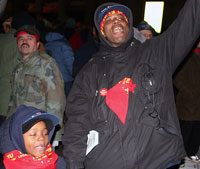Transit union seeks a decent contract
NYC riders support workers over MTA bosses
By
Milt Neidenberg
New York
Published Dec 15, 2005 1:57 AM
Dec. 14—With the
countdown to a possible transit strike in New York just two days away, thousands
of members of Local 100 of the Transport Workers Union converged on 42nd Street
across from Grand Central Station at rush hour on Dec. 13. Their chant of
“Shut the city down!” was an angry rallying cry in response to the
Metropolitan Transit Authority’s heavy pressure to force a weak contract
on them.
|
Workers rally as MTA threatens
huge fines.
|
With their sea of placards and banners, these workers sent a
powerful message to the MTA, Mayor Michael Bloomberg and Gov. George Pataki.
They would not be intimidated in their fight for a decent contract. They found a
sympathetic ear from workers and shoppers making their way through the congested
streets to subways and buses.
The MTA, top Republican and Democratic city
officials, and the major media are waging a frenzied anti-union campaign to get
the workers to accept a two-tier wage contract that would create divisions
within the union. However, a progressive group of City Council members from
working-class neighborhoods held a press conference on Dec. 14 to say that any
strike will be the responsibility of the MTA.
The MTA wants newly hired
workers to pay 2 percent of their wages toward health benefits. This includes
higher premiums, deductibles and co-payments. It demands the union extend the
retirement age to 62 from 55. It has offered a paltry wage increase that is far
below the cost of living in a city where rent, food, energy and other goods and
services are rising at an alarming rate.
The arrogance of the MTA bosses
extends to working conditions. They demand more productivity from workers who
have to labor in an atmosphere fraught with dangers and unhealthy conditions,
both in the subways and the streets above. They demand tighter restrictions on
sick leave. They want a one-person train operation—conductors would be
removed from trains. They have closed station booths and reassigned clerks to
cleaning and other station chores.
There are presently 2,700 conductors
and 3,300 station agents in the subway system; they make up almost 18 percent of
the union.
Another sore point is the tens of thousands of disciplinary
actions taken against the workers every year. New York 1 television news
reported that a worker cleaning the platforms can be disciplined just for
answering a rider’s questions about subway service.
The contract
expires at midnight on Dec. 15. The transit workers at a mass rally on Dec. 10,
in the most democratic fashion, voted overwhelmingly to authorize a strike. The
vote sent a powerful message to the MTA to start negotiating in good faith.
Instead, the MTA went to State Supreme Court and got a preliminary
injunction that would impose huge fines on the union itself and also punish the
34,000 individual transit workers with the loss of two days’ pay for each
day they’re on strike.
The bosses are relying on the Taylor Law, an
anti-labor law in New York State passed nearly 40 years ago and signed by
then-Gov. Nelson Rockefeller, a scion of the billionaire Rockefeller dynasty.
Another billionaire, New York Mayor Michael Bloomberg, has also filed a
lawsuit that asks the court to fine the TWU $1 million and each striker $25,000
on the first day of a strike—and double the fines every day the strike
goes on.
Showing contempt for the right of the transit workers to exercise
their right to withhold their labor and express their free assembly and free
speech rights, these capitalist politicians have torn up the U.S. Constitution.
The high-paid MTA executives provoked this crisis. Crying poverty, they
covered up a billion-dollar surplus until they were exposed for cooking the
books. They had already divided up this surplus in their own interests, applying
most of the funds to replacing workers with technology.
The MTA claims
the pension fund is under-funded, a typical corporate maneuver, and has promised
to put back the money.
The transit workers, who created the wealth of the
MTA and should be the trustee of those funds, want a major part of this surplus.
They may have to strike or plan other actions to get it. TWU president Roger
Toussaint told the crowd at the rally, which stretched over several blocks,
“They’re not going to force a lousy contract down our
throats.”
To end his speech, Toussaint tore a copy of the Bloomberg
lawsuit into little pieces, to thunderous cheers from the members. Other
speakers included the Rev. Al Sharpton, the Rev. Jesse Jackson, and a number of
leaders from other labor unions.
Chris Silvera, president of Teamsters
Local 808, representing Metro North and Long Island Rail Road, let the transit
workers know that the MTA’s plans to get Bronx and Queens straphangers
into Manhattan that way will not happen. “We will take care of scabs the
Teamster way,” he said.
The negotiations will go down to the wire.
If there is a strike, the responsibility for it lies with the MTA, Governor
Pataki and Mayor Bloomberg.
The money is there and the demands of the
transit workers are just. The labor movement and the straphangers have a stake
in the outcome of this struggle.
Articles copyright 1995-2012 Workers World.
Verbatim copying and distribution of this entire article is permitted in any medium without royalty provided this notice is preserved.
Workers World, 55 W. 17 St., NY, NY 10011
Email:
[email protected]
Subscribe
[email protected]
Support independent news
DONATE


